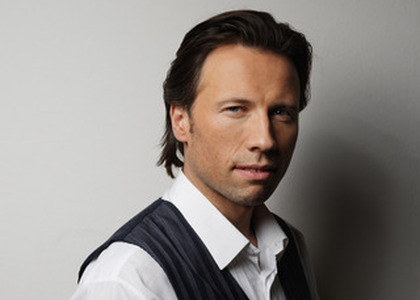> [Archived] Interviews

Interview with conductor Kristjan Järvi
Conductor Kristjan Järvi will lead the George Enescu Philharmonic Orchestra in two concerts on Thursday, October 17th and Friday, October 18th. On this occasion, the Estonian musician spoke to our colleague Ioana Țintea:
How are the rehearsals with the musicians of the "George Enescu" Philharmonic Orchestra going?
Great! I told them that we practically achieved extraordinary flexibility in just two days of rehearsals. Our approach was completely different, almost like a shamanic experience, with an understanding and awareness of the orchestra as a living organism that breathes, moves, flows and plays together. As with a flock of birds, moving together without anyone telling them what to do, because they have liberated themselves within and trust each other.
Kristjan Järvi, you belong to a family with tradition in the world of music. You are conductor, composer, producer, you also have your own record label - a versatile musician who always knows how to reinvent himself. What is the secret of a successful career?
The success is not wanting to build a career, because if you have this ambition, you will always follow a mental strategy which will keep you only at a rational level. But if you want to be more than you already are and you are full of passion and desire, everything will come easily, thanks to the law of attraction. Practically, it is an organic way because if everyone has the courage to break free, then they reflect themselves in everything they do. So, what one sees in the world, it is actually a reflection of oneself, and what one receives back it is exactly what one sees.
But there is always something that tries to lead us astray. In this way, we end up getting lost and no longer really understand who we are. Many people choose not to take responsibility for their own path and follow the path of another. But in fact, each of us is God. This is how I interpret the Bible: when Jesus says "I and my Father are one" - it means that God is us. Heaven is not somewhere far away, it is right here. If we are in heaven, we see him all around us. Everything is in plain sight, but hidden before our eyes. In this difficult world, we all face struggles, but in fact everything is simpler than it seems. The less we want something, the more we are likely to get it.
You will conduct a diverse program at the Romanian Athenaeum, starting with your own composition, Aurora, included on the album "Nordic Escapes", released in 2021. How would you describe this work?
Aurora can have many meanings. We live in a magical world, one that truly exists in our consciousness. I would encourage everyone to look at the world from the inside out. That's where Aurora is born. The work is deeply influenced by Sibelius, who is one of my favorites. I feel at home in his music, a true state of nirvana.
You have collaborated with violinist Vlad Stănculeasa on other occasions. How would you describe your artistic relationship with him?
I love him! He was concertmaster of the Gstaad Festival Orchestra, and if you listen to my version of Tchaikovsky's "Swan Lake" ballet with this ensemble, all the violin solo moments are played by Vlad Stănculeasa. We are friends, although we haven't seen each other for a long time.
As for the Second Symphony by Jean Sibelius, how would you describe the Finnish composer's sound universe?
As I said to the musicians in the orchestra, this Sibelius work is a symphony with shamanistic influences. It is very sincere and natural! In fact, all Sibelius' music is the mirror of his own being in this wonderful reality called existence.
You are recognized for your energetic conducting style and for bringing a modern touch to your performances. How do you strike a balance between respect for tradition and innovation?
Tradition can be an excuse to stay in the comfort zone. Usually we are talking about people who have introduced something new and expanded that comfort zone, a process that has taken time and has not been easy. In my case, 15 years ago I started the Baltic Philharmonic Orchestra. From these musicians, I took the next step in the evolution of orchestras by starting a group called Nordic Pulse. It is not an orchestra, but a band that performs on orchestral instruments. Often the mentality of an ensemble is that it belongs to its founders, right? and depends very much on close collaboration between its members. You can create an ensemble with your friends, where you compose the music, and you dedicate yourself totally for the good of the group. You are passionately committed to the process, whether you are paid or not. It's a different mindset. And this is the next step in my professional development.
I think that an orchestra can play from memory, standing up, choreographing, and completely open up in a different way than we do now. The essence of an orchestra can evolve into something that it is not today, but is held back by so-called traditions. Once we overcome these obstacles, I want to be the first to play with my band Nordic Pulse in stadiums. My dream is to play Enescu's Rhapsody I, to thrill everyone and turn every concert into a celebration of life, not just for a thousand people, but for 50,000, just like at a Coldplay concert.
Translated by Vlad-Cristian Dinu,
University of Bucharest, Faculty of Foreign Languages and Literatures, MTTLC, year II
Corrected by Silvia Petrescu














